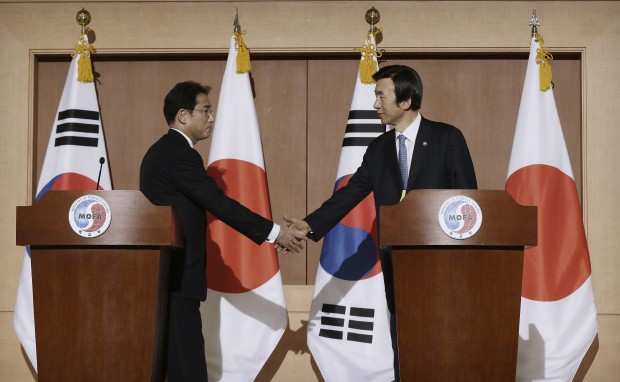
- South Korean Foreign Minister Yun Byung-se, right, shakes hands with his Japanese counterpart Fumio Kishida after their joint press conference at Foreign Ministry in Seoul, South Korea, Monday, Dec. 28, 2015. The foreign ministers said they had reached a deal meant to resolve a decades-long impasse over Korean women forced into Japanese military-run brothels during World War II, a potentially dramatic breakthrough between the Northeast Asian neighbors and rivals. (AP Photo/Ahn Young-joon)
The Seoul government on Tuesday set the ball rolling to execute Monday’s bilateral agreement with Tokyo to settle the issue of Japan’s wartime sexual slavery, despite escalating controversy over the ambiguity of the clauses and objections from the victims and civic groups.
READ: South Korea, Japan strike deal on ‘comfort women’
Seoul’s Foreign Ministry began its internal preparatory work for the establishment of a fund to support the Korean victims. Under the agreement, the two countries are to form a fund with Tokyo providing 1 billion yen ($8.3 million) from its state coffers.
No decision has yet been made as to who will manage the fund and how it will be used.
The ministry is expected to launch working-level consultations with the Ministry of Gender Equality and Family early next year to work out the details. The government plans to launch the fund in the first half of next year.
The biggest challenge to Seoul’s implementation of the agreement is the negative reactions by some of the victims to the deal over the “comfort women” issue, one of the two countries’ thorniest bilateral issues. Comfort woman is a euphemism for former sex slaves.
The dissenting victims argue that Monday’s deal was a result of “diplomatic collusion” between Seoul and Tokyo that was pushed without the due procedures of securing support from the victims and activists who have fought for the issue for more than two decades.
To address the protest, the Foreign Ministry sent its two vice ministers to the Korean Council for the Women Drafted for Military Sexual Slavery in Seoul and the House of Sharing in Gwangju, Gyeonggi Province. The two organizations have led the nationwide campaign to pressure Tokyo to apologize for its wartime wrongdoings.
When First Vice Minister Lim Sung-nam arrived at the council, the former sex slaves vented their anger at Monday’s agreement, saying they would not accept it.
“The argument that the issue was settled is ludicrous. It has not been settled,” said Lee Yong-su, one of the victims. “We were not fighting for this kind of settlement.”
The victims and activists pointed out that the government failed to secure Japan’s acknowledgement of its legal responsibility for the sexual slavery. They also criticized the government for agreeing to affirm that the issue had been settled “finally and irrevocably” through the deal.
A senior Seoul official claimed that the wording “finally and irrevocably” was first proposed by Seoul to ensure that Japan would not reverse its apology and contrition for the past atrocities.
A set of other challenges could complicate the efforts to run the fund.
The dissenting victims could refuse to accept any support from the fund, which in turn would incapacitate the significance of the agreement as a whole. There also remain different interpretations of the agreement, which is also reportedly preconditioned that Korea and Japan must mutually agree on the way the funds are spent, meaning its operation could be heavily influenced politically.
The remaining issue of relocating the statue of a girl representing the former sex slave in front of the Japanese Embassy is also likely to further stoke protest from Koreans.
Amid the growing dissent, Cheong Wa Dae was seen aiming to shift the attention to the issue of “restoring the honor and dignity” of the victims.
“The agreement was made based on (Seoul’s) firm principle that the issue must be settled in a direction that restores the honor and dignity of the victims and heals their psychological scars,” presidential spokesperson Jeong Yeon-guk told reporters.
Prime Minister Hwang Kyo-ahn underscored the need for the “conscientious” implementation of the agreement, saying that the agreement should serve as an opportunity to affirm that any such atrocity should not be repeated.
“We hope that through the implementation of the agreement, scars on the minds of the victims can be removed,” he said during a parliamentary session. “The government will try its utmost to support the victims.”
Japan also began its efforts to enforce the bilateral agreement. Japanese Prime Minister Shinzo Abe reportedly instructed his government to ensure that “follow-up” measures are carried out “thoroughly” to implement the agreement.
Meanwhile, conservatives in Japan were seen downplaying Tokyo’s recognition of its military’s responsibility for the wartime atrocities, with some arguing that it was not just the Japanese military that committed the misdeeds in battle zones.
In particular, they claimed civilians ran the military brothels, and that Japan, as a state, did not forcibly mobilize sex slaves.
“If Japan had to apologize for its military’s involvement (in the wartime misdeeds), other countries should also apologize and express their contrition,” said Toru Hashimoto, former Osaka mayor.
He infuriated South Koreans in the past by saying that during World War II, all other countries ran a system of military brothels, which Japan called “comfort stations.”